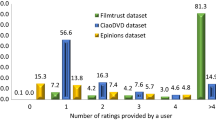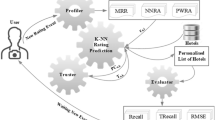Abstract
Smart services are a concept that provides services to the citizens in an efficient manner. The online shopping and recommender system can play an important role for smart cities in providing relevant item recommendations to the users. One of the famous Recommendation System strategies is known as Collaborative Filtering and provides popular suggestions to the users. The recommendation is generated by identifying a set of similar users from a user-item rating matrix using a similarity measure. The problem with the majority of the recommender systems is whether the generated recommendations are good enough because users usually find recommendations from their circle more appealing. It is important to use only those similar users that have some kind of trust among them. The accuracy of the recommendations also gets affected due to the sparsity of the user-item matrix. To handle these problems, a trust-based technique TrustASVD++ is proposed, which combines a user’s trust data in the Matrix Factorization context. The proposed method combines trust values with user ratings for improved recommendations using Pearson Correlation Coefficient (PCC). PCC is compared with other state-of-the-art similarity measures, and the results obtained show that PCC outperforms all the other relevant measures. To assess the efficiency of the offered strategy, testing on numerous datasets has been carried out including Epinions, FilmTrust, and Ciao. The results illustrate the considerable improvement of the proposed method over numerous contemporary techniques.


Similar content being viewed by others
References
Núñez-Valdéz ER, Lovelle JMC, Martínez OS, García-Díaz V, De Pablos PO, Marín CEM (2012) Implicit feedback techniques on recommender systems applied to electronic books. Comput Hum Behav 28(4):1186–1193
Lee SK, Cho YH, Kim SH (2010) Collaborative filtering with ordinal scale-based implicit ratings for mobile music recommendations. Inf Sci 180(11):2142–2155
Shambour Q, Lu J (2015) An effective recommender system by unifying user and item trust information for B2B applications. J Comput Syst Sci 81(7):1110–1126
Zhang Z, Lin H, Liu K, Wu D, Zhang G, Lu J (2013) A hybrid fuzzy-based personalized recommender system for telecom products/services. Inf Sci 235:117–129
Al-Hassan M, Lu H, Lu J (2015) A semantic enhanced hybrid recommendation approach: a case study of e-Government tourism service recommendation system. Decis Support Syst 72:97–109
Protasiewicz J, Pedrycz W, Kozłowski M, Dadas S, Stanisławek T, Kopacz A, Gałężewska M (2016) A recommender system of reviewers and experts in reviewing problems. Knowl-Based Syst 106:164–178
Adomavicius G, Tuzhilin A (2005) Toward the next generation of recommender systems: a survey of the state-of-the-art and possible extensions. IEEE Trans Knowl Data Eng 17(6):734–749
Azadjalal MM, Moradi P, Abdollahpouri A, Jalili M (2017) A trust-aware recommendation method based on Pareto dominance and confidence concepts. Knowl-Based Syst 116:130–143
Moradi P, Ahmadian S, Akhlaghian F (2015) An effective trust-based recommendation method using a novel graph clustering algorithm. Phys A 436:462–481
Massa P, Avesani P (2007) Trust-aware recommender systems. In: Proceedings of the 2007 ACM Conference on Recommender Systems, pp 17–24
Guo G, Zhang J, Yorke-Smith N (2015) Trustsvd: collaborative filtering with both the explicit and implicit influence of user trust and of item ratings. In: Proceedings of the AAAI Conference on Artificial Intelligence, vol 1
Jamali M, Ester M (2010) A matrix factorization technique with trust propagation for recommendation in social networks. In: Proceedings of the Fourth ACM Conference on Recommender systems, pp 135–142
Bobadilla J, Ortega F, Hernando A, Gutiérrez A (2013) Recommender systems survey. Knowl Based Syst 46:109–132
Lu J, Wu D, Mao M, Wang W, Zhang G (2015) Recommender system application developments: a survey. Decis Support Syst 74:12–32
Shambour Q (2021) A deep learning based algorithm for multi-criteria recommender systems. Knowl Based Syst 211:106545
Fu Z, Gao H, Guo W, Jha SK, Jia J, Liu X, Long B, Shi J, Wang S, Zhou M (2020) Deep learning for search and recommender systems in practice. In: Proceedings of the 26th ACM SIGKDD International Conference on Knowledge Discovery & Data Mining, pp 3515–3516
Dong M, Yuan F, Yao L, Wang X, Xu X, Zhu L (2020) Trust in recommender systems: a deep learning perspective. arXiv preprint arXiv:2004.03774
Bobadilla J, Alonso S, Hernando A (2020) Deep learning architecture for collaborative filtering recommender systems. Appl Sci 10(7):2441
Chaney AJ, Blei DM, Eliassi-Rad T (2015) A probabilistic model for using social networks in personalized item recommendation. In: Proceedings of the 9th ACM Conference on Recommender Systems, pp 43–50
Moradi P, Ahmadian S (2015) A reliability-based recommendation method to improve trust-aware recommender systems. Expert Syst Appl 42(21):7386–7398
Wu H, Yue K, Pei Y, Li B, Zhao Y, Dong F (2016) Collaborative topic regression with social trust ensemble for recommendation in social media systems. Knowl Based Syst 97:111–122
Salah A, Rogovschi N, Nadif M (2016) A dynamic collaborative filtering system via a weighted clustering approach. Neurocomputing 175:206–215
Gohari FS, Aliee FS, Haghighi H (2018) A new confidence-based recommendation approach: Combining trust and certainty. Inf Sci 422:21–50
Ar Y, Bostanci E (2016) A genetic algorithm solution to the collaborative filtering problem. Expert Syst Appl 61:122–128
More D, Phand A, Komarashetty N, Choudhari S, Vengurlekar PN (2019) News recommendation based on user preferences and location. Int Res J Eng Technol 6(02):5160-5164
Pereira N, Varma SL (2019) Financial planning recommendation system using content-based collaborative and demographic filtering. In: Smart Innovations in Communication and Computational Sciences. Springer, pp 141–151
Rutkowski T, Romanowski J, Woldan P, Staszewski P, Nielek R, Rutkowski L (2018) A content-based recommendation system using neuro-fuzzy approach. In: 2018 IEEE International Conference on Fuzzy Systems (FUZZ-IEEE). IEEE, pp 1–8
Wang J-C, Chiu C-C (2008) Recommending trusted online auction sellers using social network analysis. Expert Syst Appl 34(3):1666–1679
Ma H, King I, Lyu MR (2009) Learning to recommend with social trust ensemble. In: Proceedings of the 32nd International ACM SIGIR Conference on Research and Development in Information Retrieval. pp 203–210
Lu Y, Tsaparas P, Ntoulas A, Polanyi L (2010) Exploiting social context for review quality prediction. In: Proceedings of the 19th International Conference on World Wide Web, pp 691–700
Lin T-H, Gao C, Li Y (2018) Recommender systems with characterized social regularization. In: Proceedings of the 27th ACM International Conference on Information and Knowledge Management, pp 1767–1770
Cui L, Sun L, Fu X, Lu N, Zhang G (2017) Exploring a trust based recommendation approach for videos in online social network. J Signal Process Syst 86(2–3):207–219
Mei J-P, Yu H, Shen Z, Miao C (2017) A social influence based trust model for recommender systems. Intell Data Anal 21(2):263–277
Wang Y, Yin G, Cai Z, Dong Y, Dong H (2015) A trust-based probabilistic recommendation model for social networks. J Netw Comput Appl 55:59–67
Lee W-P, Ma C-Y (2016) Enhancing collaborative recommendation performance by combining user preference and trust-distrust propagation in social networks. Knowl Based Syst 106:125–134
Faridani V, Jalali M, Jahan MV (2017) Collaborative filtering-based recommender systems by effective trust. Int J Data Sci Anal 3(4):297–307
Ma X, Ma J, Li H, Jiang Q, Gao S (2018) ARMOR: A trust-based privacy-preserving framework for decentralized friend recommendation in online social networks. Futur Gener Comput Syst 79:82–94
Tian H, Liang P (2017) Personalized service recommendation based on trust relationship. Sci Program 2017:1–8
Parvin H, Moradi P, Esmaeili S (2018) A collaborative filtering method based on genetic algorithm and trust statements. In: 2018 6th Iranian Joint Congress on Fuzzy and Intelligent Systems (CFIS), IEEE, pp 13–16
Navgaran DZ, Moradi P, Akhlaghian F (2013) Evolutionary based matrix factorization method for collaborative filtering systems. In: 2013 21st Iranian Conference on Electrical Engineering (ICEE). IEEE, pp 1–5
Takács G, Pilászy I, Németh B, Tikk D (2009) Scalable collaborative filtering approaches for large recommender systems. J Mach Learn Res 10:623–656
Jabeen F, Maqsood M, Ghazanfar MA, Aadil F, Khan S, Khan MF, Mehmood I (2019) An IoT based efficient hybrid recommender system for cardiovascular disease. Peer-to-Peer Netw Appl 12(5):1263–1276
Iqbal M, Ghazanfar MA, Sattar A, Maqsood M, Khan S, Mehmood I, Baik SW (2019) Kernel context recommender system (KCR): a scalable context-aware recommender system algorithm. IEEE Access 7:24719–24737
Sampaul Thomas GA, Robinson YH, Julie EG, Shanmuganathan V, Nam Y, Rho S (2020) Diabetic retinopathy diagnostics from retinal images based on deep convolutional networks. https://doi.org/10.20944/preprints202005.0493.v1
Nawaz H, Maqsood M, Afzal S, et al (2020) A deep feature-based real-time system for Alzheimer disease stage detection. Multimed Tools Appl. https://doi.org/10.1007/s11042-020-09087-y
Jung S, Moon J, Park S, Rho S, Baik SW, Hwang E (2020) Bagging ensemble of multilayer perceptrons for missing electricity consumption data imputation. Sensors 20(6):1772
Bukhari M, Bajwa KB, Gillani S, Maqsood M, Durrani MY, Mehmood I, Ugail H, Rho S (2020) An efficient gait recognition method for known and unknown covariate conditions. IEEE Access 9:6465–6477
Yasir M, Durrani MY, Afzal S, Maqsood M, Aadil F, Mehmood I, Rho S (2019) An intelligent event-sentiment-based daily foreign exchange rate forecasting system. Appl Sci 9(15):2980
Jifara W, Jiang F, Rho S, Cheng M, Liu S (2019) Medical image denoising using convolutional neural network: a residual learning approach. J Supercomput 75(2):704–718
Muhammad K, Ahmad J, Mehmood I, Rho S, Baik SW (2018) Convolutional neural networks based fire detection in surveillance videos. IEEE Access 6:18174–18183
Kalsoom A, Maqsood M, Ghazanfar MA, Aadil F, Rho S (2018) A dimensionality reduction-based efficient software fault prediction using Fisher linear discriminant analysis (FLDA). J Supercomput 74(9):4568–4602
Jiang F, Grigorev A, Rho S, Tian Z, Fu Y, Jifara W, Adil K, Liu S (2018) Medical image semantic segmentation based on deep learning. Neural Comput Appl 29(5):1257–1265
Maqsood H, Mehmood I, Maqsood M, Yasir M, Afzal S, Aadil F, Selim MM, Muhammad K (2020) A local and global event sentiment based efficient stock exchange forecasting using deep learning. Int J Inf Manag 50:432–451
Afzal S, Maqsood M, Nazir F, Khan U, Aadil F, Awan KM, Mehmood I, Song O-Y (2019) A data augmentation-based framework to handle class imbalance problem for Alzheimer’s stage detection. IEEE Access 7:115528–115539
Ayub M, Ghazanfar MA, Mehmood Z, Saba T, Alharbey R, Munshi AM, Alrige MA (2019) Modeling user rating preference behavior to improve the performance of the collaborative filtering based recommender systems. PLoS ONE 14(8):e0220129
Parvin H, Moradi P, Esmaeili S, Qader NN (2019) A scalable and robust trust-based nonnegative matrix factorization recommender using the alternating direction method. Knowl Based Syst 166:92–107
Acknowledgements
This research was supported by the National Research Foundation of Korea (NRF) Grant funded by the Korea government (MSIT) (No. 2020R1F1A1076976).
Author information
Authors and Affiliations
Corresponding authors
Additional information
Publisher's Note
Springer Nature remains neutral with regard to jurisdictional claims in published maps and institutional affiliations.
This paper is an extended version of our paper published in the Proceedings of the 2020 International Conference on Computational Science and Computational Intelligence (CSCI’20), Las Vegas, USA, 16–18 Dec 2020.
Rights and permissions
About this article
Cite this article
Rahim, A., Durrani, M.Y., Gillani, S. et al. An efficient recommender system algorithm using trust data. J Supercomput 78, 3184–3204 (2022). https://doi.org/10.1007/s11227-021-03991-2
Accepted:
Published:
Issue Date:
DOI: https://doi.org/10.1007/s11227-021-03991-2




